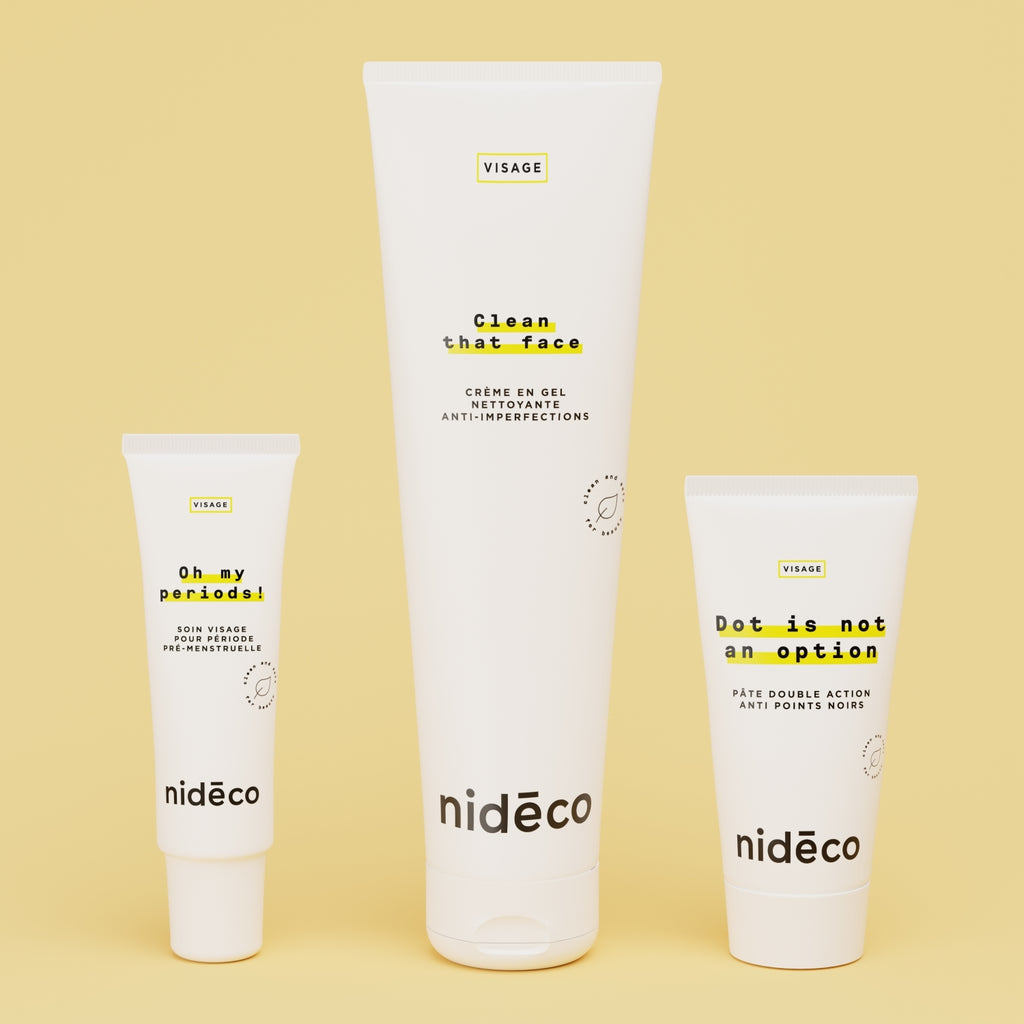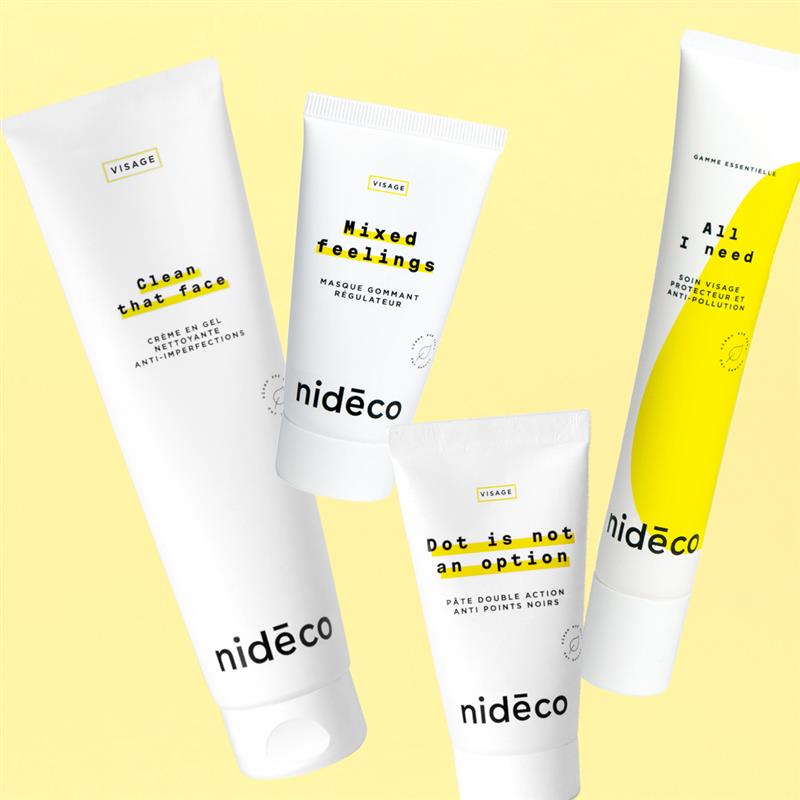How to get rid of body acne?

🥲 L'body acne is a reality for many people, and can become a real complex and a daily ordeal. Although it's less visible than facial acne, it's no less embarrassing and requires appropriate care. In this article, we'll explore the causes of body acne, the areas most affected and the best methods for getting rid of it.
Understanding body acne
Causes of body acne
👉 Acne on the body has many of the same origins as acne on the face. Contributing factors include:
- Hormonal activity: periods of high hormonal activity, such as adolescence, can lead to an overproduction of sebum. This excess sebum blocks pores, leading to inflammation in the form of comedones, papules or pustules.
- Genetic predisposition: Some people are genetically predisposed to produce more sebum or have skin that is more sensitive to acne-causing bacteria.
- Unsuitable routine: Using products that aren't suited to your skin type can make acne worse. Products that are too greasy or not rinsed thoroughly can clog pores.
- Pollution: Impurities in the air can settle on the skin, causing inflammation and rashes.
The areas most affected
👉 Body acne can appear anywhere there are sebaceous glands. The most common areas include:
- The back: Often called "bacne", acne on the back is common due to the high concentration of sebaceous glands.
- Arms: The arms can also be affected, especially the upper part.
- Legs and buttocks: These areas are particularly prone to keratosis pilaris, a condition that manifests itself as small acne-like pimples.
- Cleavage: A sensitive area that can be easily irritated by perspiration and tight clothing.
Preventing and treating body acne
Adopt a suitable routine
😁 To limit the appearance of pimples and treat body acne, it is crucial to follow a suitable routine:
Clean properly
✨It's important to cleanse your skin properly, especially after physical activity. Use a gentle cleanser like Clean that face, which is initially designed for the face but also works very well for the body. Make sure you rinse all areas thoroughly, especially the back, to avoid product residues that can clog pores.
Gently exfoliate
✅ Exfoliation helps remove dead cells that can clog pores. However, it's crucial to avoid scrubs with grains that are too coarse, as they can irritate the skin and cause further inflammation.
To limit the appearance of pimples, you can apply Fesse Time. Originally designed for small pimples on the buttocks, it is also ideal for problems on the arms, back, legs and décolleté. In particular, its lactic acid content enables a very gentle chemical peel, accelerating cell renewal.
Moisturize effectively
💧 Well-moisturized skin is healthier and less prone to acne. Use a light, non-greasy moisturizer, such as I'm not a mermaidwhich moisturizes without leaving a greasy or sticky finish. Proper hydration keeps skin supple and helps prevent clogged pores.
Avoid irritants
Perspiration and friction
Areas of the body where acne is frequent are often subject to excessive perspiration and friction, which can worsen the condition of the skin. To avoid this:
- Wear loose-fitting, breathable clothing.
- Take a shower after any strenuous physical activity to remove sweat and bacteria from the skin.
Products to avoid
❌ Some body products can aggravate acne if not rinsed thoroughly. These include shower gels, shampoos and conditioners. Make sure you rinse your skin well to avoid any residue that could clog pores.
Home remedies and natural solutions
Tea tree oil
Tea tree oil is an excellent natural acne remedy thanks to its antibacterial properties. Apply a small amount of diluted oil to the affected areas to reduce inflammation and fight bacteria.
Aloe vera
🪴 Aloe vera is known for its soothing and moisturizing properties. Use aloe vera gel on affected areas to calm skin and reduce redness.
When should you consult a healthcare professional?
Severe acne
😕 If, despite all these efforts, your body acne persists or worsens, it may be time to consult a health professional. Some forms of acne are more severe and require medical treatment. Possible treatments include benzoyl peroxide-based formulas or antibiotics to reduce inflammation and fight bacteria.
Medical solutions
A dermatologist can suggest solutions tailored to your skin type and the severity of your acne. These may include :
- Topical treatments: Creams or gels containing benzoyl peroxide, retinoids or antibiotics.
- Oral medications: In more serious cases, medications such as antibiotics or isotretinoin may be prescribed.
- Laser or light therapies: These treatments can help reduce acne by decreasing bacteria and reducing inflammation.
Additional tips to prevent body acne
Healthy living
👉 Maintaining a healthy lifestyle can also help prevent body acne. Here are a few tips:
- Balanced diet: A diet rich in fruits, vegetables and whole grains can improve the health of your skin.
- Hydration: Drink plenty of water to keep your skin hydrated from the inside out.
- Reduce stress: Stress can aggravate acne. Practice stress management techniques such as yoga, meditation or breathing exercises.
Suitable products
Use skin care products adapted to your skin type. Avoid products that are too oily or comedogenic, which can clog pores. Opt for light, non-comedogenic formulas.
Daily habits
- Change clothes regularly: Wear clean clothes and avoid reusing sweaty or dirty clothes.
- Clean your sheets: Change your sheets and bedding regularly to prevent the build-up of bacteria and dead skin cells.
- Avoid touching affected areas: Touching or scratching pimples can aggravate acne and cause infections.
Conclusion
👉 Body acne can be embarrassing and affect self-confidence, but with the right routine and care, it's possible to get rid of it. Adopt rigorous hygiene, use suitable products, and don't hesitate to consult a health professional if necessary. With patience and perseverance, you can regain healthy, radiant skin.
































